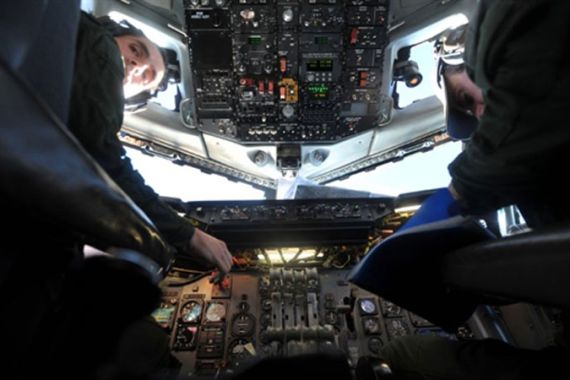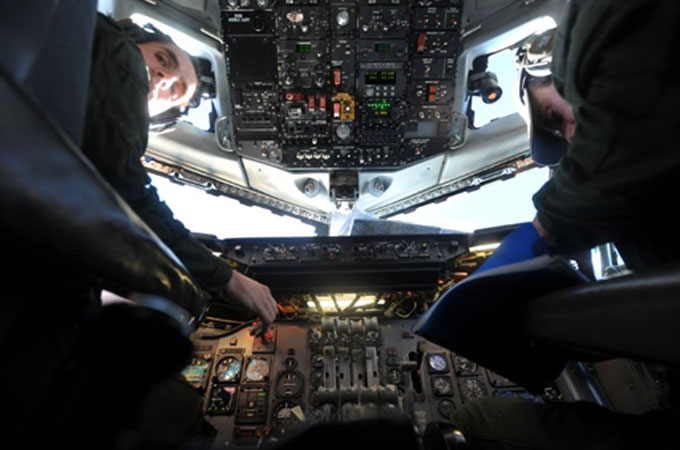Coalition of eager vs not so eager
Assessing the degree of military action and inaction of foreign states in Libya war.

 |
|
The French and British governments have lead the military intervention in Libya, despite having been among the most enthusiastic supporters of Gaddafi’s rehabilitation in the 2000s [AFP] |
The twenty years since the opening shots of the 1991 Gulf War have repeatedly demonstrated the effects of high technology in achieving air superiority and information superiority against a modern state.
While the US war fighting doctrine has steadily grown in intensity and effectiveness, it has been repeatedly rejected at a moral level by a global public that is much more concerned about civilian deaths and international law than the minimisation of American military losses.
The opening stage (brutally but appropriately described as “kicking down the door”) is the “strategic” air campaign that targets leadership, communications, and air defences and demands the most sophisticated technology from electronic warfare and satellite intelligence to ‘smart’ munitions and cruise missiles from stealth bombers and submarines.
This is usually followed by a “tactical” air campaign designed to weaken and destroy enemy forces in the field – tanks, artillery and troop concentrations – often in conjunction with a ground offencive.
Although preceded by a series of emergency French strikes around Benghazi, the March 20th strike on Gaddafi’s Aziziya headquarters has garnered far more international attention.
Such attacks aim to destroy a government’s ability to issue and carry out decisions (“command and control”) and involve attacks on the centres of power (“decapitation”), as seen in Belgrade in 1998, Afghanistan in 2001 and Baghdad in 2003.
Killing Gaddafi, like killing Saddam, is seldom openly acknowledged as a military objective, but keeping him incommunicado and on the run at the very least is essential to US and NATO operations.
Even as the United States has once again demonstrated its unparalleled ability to wage this kind of warfare against formal governments, it continues to struggle to defeat low-tech actors operating on a guerrilla footing, whether in Serbia, Iraq or Afghanistan-Pakistan.
To smash an irregular opponent requires a combination of national and regional consensus, political skill, and considerable manpower, a recipe that the United States has only very rarely been able to muster or sustain.
Coalition of the eager?
It is this concern of being sucked in to another insurgency that has produced the distinct lack of enthusiasm for a Libyan intervention among military and DOD leadership in the United States.
The New York Times’ gendered portrayal of the decision to intervene in Libya as the result of the humanitarian instincts of three of the most powerful women in the Obama administration (Clinton, Rice and Powers) dramatises the deep divisions in Washington on the matter.
Given all of this the United States is only too happy to relinquish leadership of the military operation to NATO under the French and British.
The French and British governments on the other hand have both pushed hard for military intervention, leading the charge internationally despite having been among the most enthusiastic supporters of Gaddafi’s rehabilitation in the 2000s.
Sarkozy in particular has pushed hard since 2008 for a “Mediterranean Union” that economically integrated Europe, the Levant and Northern Africa, and Libya’s oil reserves have been central to this vision.
The opening French air-strike on regime tanks on March 19th around Benghazi was an important sign of support to an increasingly desperate Libyan resistance, but in some senses also jumped the gun.
Ignoring the Anglo-American playbook signaled a traditional reluctance to fully subordinate France to an operational plan and command structure that did not give it the dominant voice, or respect Gallic sensitivity to political rather than military factors.
More to the point, France’s differences with the rest of Europe are even greater. It is worth noting that Coalition planning at the political level was finalized at the March 19th Paris Summit, rather than through NATO’s structure due to French concern over German and Turkish opposition.
While countries like Norway, Holland and Italy are willing to contribute small numbers of aircraft, Germany has made it clear that it wants to see military action kept to an absolute minimum and that it will not be involved in enforcing UN resolutions, although its bases have been key to air operations.
…and the not so eager
As Gaddafi’s use of force against dissidents and rebels dramatically escalated over the first three weeks of the conflict, a number of public figures from the Middle East and Muslim world called on local powers, particularly Egypt and Turkey, to intervene.
Their response was underwhelming to say the least, creating an opening for the US and Europe to take the lead in organizing and carrying out military action.
Despite the Arab League’s decision on March 12th to authorise a NFZ and the Arab presence at the Paris Summit, recent statements from figures such as Amr Moussa have reflected the deep ambivalence of regional leadership that has dismayed (but probably not surprised) most Libyans.
Qatar is providing token but active participation in the air operations, but it is interesting to note that it is the only Arab state that has not faced unrest this year and which has no serious tension with Iran.
Saudi Arabia (able to spare troops to impose martial law in Manama) and the UAE were willing to provide aircraft, but only on the condition that the West drop support for Bahraini protestors, whom they regard as little more than Iranian puppets.
The reality is that relatively few Arab governments are willing to risk their prized billion dollar air forces even in the best of times, and most would rather see the “Arab Spring” of 2011 expire entirely.
Cynical observers point out that in most Arab states, combat forces are more likely to be used for domestic “crowd control” than for riskier regional commitments.
The Egyptian Air Force (EAF) with its ideal location, large and relatively modern (US funded and trained) forces, and new revolutionary credentials could play a major role in the tactical phase of the air campaign, but its reluctance to engage reflects its unwillingness to risk any losses.
This aversion goes back to Mubarak (himself an EAF man); it should be remembered the EAF, unlike the Egyptian Army, sat out the 1991 Gulf War.
Several reports have suggested that Egyptian intelligence is facilitating the arming of Libyan rebels in cooperation with Western governments.
This apparent contradiction suggests that just like during the Egyptian revolution of 2011, the military is following a cautious hedging strategy that will allow it to jump on to the winner’s bandwagon with minimum cost.
As we learned this February, the Egyptian military is quite bourgeois in its worldview, having morphed into a major stakeholder in the Egyptian economy.
Turkey is also curiously absent from events. It has perhaps the most modern and highly trained armed forces in the Middle East after Israel, and possesses the largest military in NATO after the US.
While some might suggest that the Turkish military, like the US military, is more interested in focusing its energies on ongoing conflicts in Kurdistan and Iraq, it is clear that Erdogan’s ruling AKP is now firmly in charge of the military.
After Erdogan’s forceful response to the flotilla incident of May 2010 Turkey was hailed as the new champion of the Arabs, and parties like Tunisia’s Nahda have publicly proclaimed their intention to follow the AKP model.
Yet Erdogan’s statement on Wednesday the 22nd shows that the party’s Arab policy is driven not by a desire to demonstrate solidarity with suffering Arab masses, but rather by its Turkish electoral base’s antipathy both to intervention in the Middle East and Israeli occupation.
While the US handover of command, and the Arab League’s continuing political influence on the operation will be viewed in a positive light, the lack of direct Arab and Turkish participation constrains their influence on the actual conduct of operations and perhaps the final outcome.
This is likely to stoke historical Arab anxieties about weakness and imperialism, especially if the conflict is prolonged, or intervention is intensified. Unfortunately at least one of those conditions is likely to occur.
The long and anxious road ahead
Taking out Gaddafi’s air force and heavy weapons on the ground evens the odds, but it does not negate his other advantages. Even in a battle of light infantry forces, Gaddafi has the upper hand in terms of cash, organisation, training and international recognition.
His access to tens of billions of dollars in personal and national funds allows him to continue to recruit African mercenaries, while his years of despotic rule, family and tribal connections provide a level of organisation that the Libyan resistance is desperately trying to match.
Building up Libyan resistance forces will take time and requires significant support in the form of arms and training on the order of what was done with the Kosovo Liberation Army in 1998-99.
Appeals for the necessary financial backing have been made to the Gulf, and Western countries are already providing the expertise and some of the weapons with Egyptian and Tunisian support.
However external support (especially when channeled clandestinely through intelligence agencies) comes with serious risks of its own as the last three decades in Afghanistan, Lebanon and Palestine show. The shadowy battle for influence by regional rivals seems to generate nasty proxy wars and bitter social strife.
A prolonged conflict is likely to allow Gaddafi to maintain a de-facto division of the country, which is utterly unacceptable to a Libyan opposition whose motto has become “Tripoli is the capital”.
Official French recognition of the transitional government in Benghazi, coupled with de-legitimisation of Gaddafi’s government has been a helpful step that other governments around the world ought to emulate if this awful conflict is to be quickly brought to a halt with minimum direct foreign intervention.
As the revolutions of 2011 have demonstrated, highly visible public pressure may be the only way to push governments out of a state of complacent denial.
Leila Hudson is associate professor of Near Eastern Studies, Anthropology and History and director of the Southwest Initiative for the Study of Middle East Conflicts (SISMEC) at the University of Arizona.
Johann Chacko is an MA candidate in the Near Eastern Studies Department at the University of Arizona and a SISMEC Research Assistant who has worked in the private sector as an open source analyst of military conflicts.
The views expressed in this article are the authors’ own and do not necessarily reflect Al Jazeera’s editorial policy.
